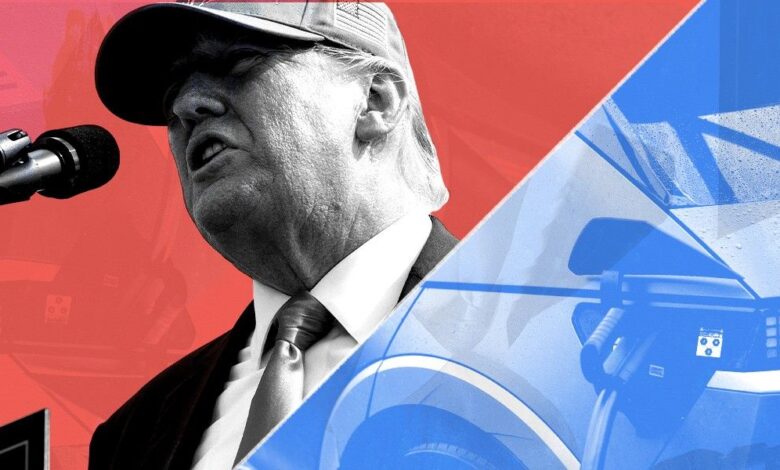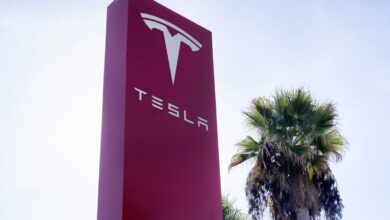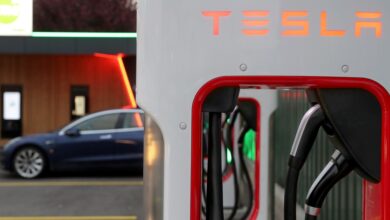Can Electric Cars Escape Identity Politics?

“What do you think of electric cars?” It’s a question Donald Trump asks the audience at his rallies these days, and the inevitable response is a chorus of boos. The mini-rant about EVs that follows is now as much a feature of Trump speeches as complaints about immigration or the injustice of his criminal indictments. As he said recently in Dayton, Ohio, “They want to do this all-electric nonsense where the cars don’t go far, they cost too much, and they’re all made in China.”
When Trump chooses to elevate an issue, he inevitably infuses it with questions of identity, the divisions between us and them. He doesn’t just tell you what to believe, he tells you that this is what our kind of people believe, and believing the opposite would make you one of our enemies, contemptible and repugnant.
Of course, EVs were already a means of expressing identity long before Trump started talking about them. None of us, no matter what our political orientation or feelings about capitalism, are immune from the impulse to make a statement to the world about our selfhood and the groups we belong to through our consumer choices, whether it’s the clothes we wear or the phone we carry or the car we drive.
But if we’re ever going to reach the point where the overwhelming majority of vehicles on the road are electric — an indispensable part of reducing carbon emissions — we’ll have to divorce the fuel source that drives a car from those identity questions.
Trump will certainly do what he can to prevent that from happening, even if his position on EVs is less than coherent. “The electric cars, automatically, are going to be made in China,” he says, yet he offers this as a reason to oppose policies that would encourage domestic production of EVs. Part of his interest is surely just about adding EVs to the list of things he can criticize President Biden for. Early in his presidency, Biden set out a goal that by 2030, half of new cars sold in the U.S. would be zero-emission, and though new tailpipe regulations from the Environmental Protection Agency push that goal back by two years, the rules give it teeth in the form of fines if car companies don’t meet the target.
It helps Trump that the target is optimistic, to say the least; only 7.6 percent of new car sales in 2023 were EVs. And Republicans delight in mocking the slow progress on building a nationwide network of charging stations, presenting it as a case study in both government inefficiency and the folly of taking action on climate change. The clear message to conservative voters is that buying an EV would violate their sense of self in a profound way, putting them on the side of Joe Biden and all those woke enviro-hippies.
From their earliest modern iterations, EVs and hybrids were indeed a statement of identity for liberals: Driving one said that you cared about pollution and climate change, and were willing to sacrifice a certain amount of convenience to lower your personal negative impact on the environment. In the right circles, a Prius could be a kind of status symbol despite its relatively modest price. The reaction from the right was contempt at anyone driving one, for the same reasons.
Though Tesla began to alter that image by marketing their EVs as stylish and technologically advanced, the political division on EVs has remained. According to a recent Gallup poll, 72 percent of liberals say they either have an EV or might buy one in the future, while an identical 72 percent of conservatives say they won’t ever buy one.
If you were a car company looking only to boost sales, that might not be too much of a problem, since in a market where around 15 million cars are sold every year, there’s plenty of room for identity segmentation. Auto companies can promote particular models to young people or suburban moms or even lesbians, and still make healthy profits. Everyone can find the car to express their identity; for instance, every year, the three best-selling vehicles in America are pickup trucks (the Ford F-series, the Ram, and the Chevy Silverado), and it isn’t because so many people need them for hauling and towing. It’s because the pickup is associated with a brand of rugged masculinity that millions of men want to present to the world, whether it’s really who they are or not.
But the goal isn’t getting some or even a lot of people to buy EVs, it’s to get nearly every car buyer to choose one. The paradox is that driving an EV may only cease to be a matter of identity when it becomes the default, and that can only happen when people of every partisan and political orientation start buying them.
We can see the glimmers of that transition in accelerating demand for hybrids. Hybrid sales grew an extraordinary 53 percent from 2022 to 2023, as more models — including low-priced ones — became available. You can even get a Ford Maverick Hybrid pickup, which is proving extremely popular, for under $25,000 (a MotorTrend article from last year was titled “We Bought a 2023 Ford Maverick Hybrid and It’s a Real F***ing Truck, Damn It!”). That greater variety of choices, combined with the increasing availability of EVs, may be depoliticizing hybrids, at least to a degree. As Heatmap’s Robinson Meyer said on a recent episode of Shift Key, “the presence of battery electric vehicles really defangs conventional hybrids because it is no longer the ‘lib car.’”
There are two critical impediments to a similar change happening for EVs: price and battery range. At the moment, going fully electric still means paying more up front compared to buying a comparable internal combustion vehicle, even if subsidies significantly lower that premium. But if getting an EV involved no extra initial cost, and charging stations were as common as gas stations, buying an EV wouldn’t say “I am willing to sacrifice to address climate change.” And it may be that the less your EV says about you — or at least, the less the fact that it’s an EV says about you — the better.
An increase in the number of EV models (which is already happening) will help too: If there are small and large EV pickups, EV sedans, EV sports cars, and critically, cheap EVs — which at the moment are only being manufactured in China — then there will be enough room to make a variety of identity statements with an EV that have nothing to do with its fuel source.
If he wins in November, Trump will probably try to reverse Biden’s tailpipe emission standards and roll back some of the EV subsidies that are now in place. But he may encounter more resistance than he thinks. Despite a recent slowdown in the growth rate of EV sales, the auto companies are still committed to transitioning to zero-emission fleets (even if they’d like to take their time getting there). And some red parts of the country are now deeply invested in EVs, especially in the “Battery Belt” in the Southeast, where EV technology companies are hiring thousands of workers and auto companies are opening EV plants.
One signal that mass adoption of EVs is imminent will be when car companies barely mention the fact that they’re electric in marketing them. When all the ads feature masculine men doing manly things with their manly electric trucks, hip and beautiful young people heading to the beach in their fun electric convertibles, and safety-conscious moms carpooling to soccer practice in their comfy electric SUVs, none of whom seem concerned about the climate, then we’ll know we’re on our way.



